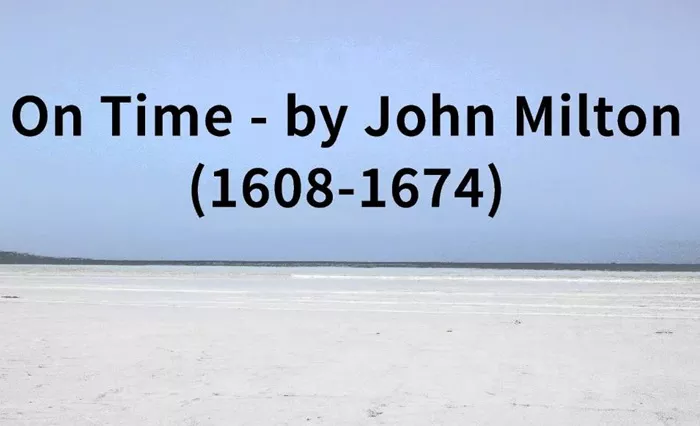Welcome to Poem of the Day – On Time by John Milton.
John Milton, one of the greatest poets of the English language, wrote extensively on various themes, including religion, politics, and human nature. Among his works, “On Time” stands out as a reflection on the passage of time and its impact on life. The poem addresses how time moves relentlessly forward, and its ability to shape, alter, and even control life. In this article, we will break down Milton’s “On Time” and explain its meaning and significance.
On Time Explanation
Understanding “On Time”
In “On Time,” Milton personifies time as a powerful force that cannot be stopped or controlled. The poem’s structure is composed of short lines that emphasize the quick passage of time, mirroring its swift nature. Milton uses vivid language to depict time’s effects, portraying it as both a destroyer and a guide. Through this, he explores the human condition, emphasizing how we are all at the mercy of time.
The Nature of Time
Milton’s depiction of time is multifaceted. He illustrates time as both a destroyer and a force for change. The opening lines of the poem hint at time’s destructive nature, as it slowly wears away everything in its path. Milton compares time to a river, continuously flowing and sweeping away life, youth, and beauty. He also acknowledges that time is necessary for progress and growth. Without it, there would be no change, no opportunity for improvement, and no movement forward.
Time’s Relentlessness
One of the central themes in Milton’s poem is time’s relentlessness. Time does not wait for anyone; it moves forward with or without the individual’s consent. Milton’s use of words like “swiftness” and “flight” paints time as a force that is impossible to catch or hold onto. This portrayal serves as a reminder of the fleeting nature of life and the inevitability of aging and death. For Milton, time is both a force to be feared and respected.
Time as a Teacher
Despite the destructive power of time, Milton also views it as a teacher. In the latter part of the poem, he suggests that time teaches us important lessons. It forces individuals to reflect on their actions, decisions, and ultimately their purpose in life. Time can lead to wisdom and understanding, helping people to grow, mature, and discover their true potential. In this sense, time is not merely a destroyer, but a guide to self-realization.
The Human Response to Time
Throughout the poem, Milton addresses how humans react to the passage of time. He explores feelings of regret, loss, and the desire to make the most of the time we have. While time cannot be controlled or stopped, the way people choose to spend it is up to them. Milton encourages readers to use time wisely, to reflect on its significance, and to live purposefully in the face of its inevitable progression.
Conclusion
John Milton’s “On Time” is a powerful reflection on the nature of time and its impact on human life. Through its vivid imagery and thoughtful analysis, Milton explores time as both a destroyer and a teacher. The poem serves as a reminder that time is precious and should be used wisely. Milton’s message is clear: time waits for no one, and it is up to us to make the most of the time we have. This poem continues to resonate with readers today, as its themes of mortality, growth, and reflection are timeless and universal.

